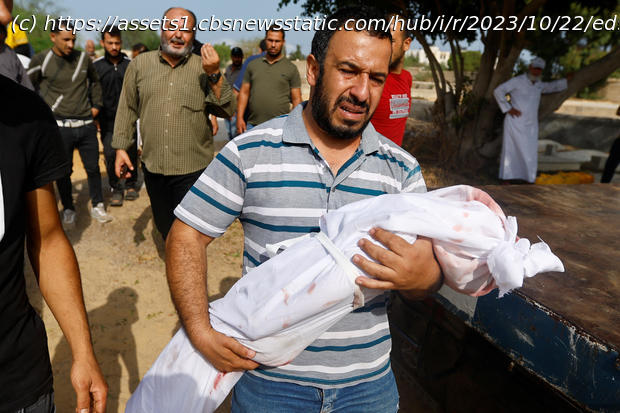The two-week old war with Hamas is threatening to spiral into a broader conflict.
Israeli warplanes struck targets across overnight and into Sunday, as well as two airports in Syria and a mosque in the occupied West Bank allegedly used by militants, as the threatened to spiral into a broader conflict.
Israel has traded fire with Lebanon’s Hezbollah militant group on a near-daily basis since the war began, and tensions are soaring in the Israeli-occupied West Bank, where Israeli forces have battled militants in refugee camps and carried out two airstrikes in recent days.
For days, Israel has seemed to be on the verge of launching a ground offensive in Gaza as part of its response to . Tanks and tens of thousands of troops have massed at the border, and Israeli leaders have spoken of an undefined next stage in operations.
Israel repeated its calls for people to leave northern Gaza, including by dropping leaflets from the air. It says an estimated 700,000 have already fled, but hundreds of thousands remain. That would raise the risk of mass civilian casualties in any ground offensive.
Israeli military officials say Hamas’ infrastructure and underground tunnel system are concentrated in Gaza City, in the north, and that the next stage of the offensive will include unprecedented force there. Israel says it wants to crush Hamas, but officials have also spoken of carving out a possible buffer zone to keep Palestinians from approaching the border.
On Saturday, 20 trucks of aid were allowed to enter Gaza from Egypt through the Rafah crossing, the first time anything has gone into the territory since Israel imposed a complete siege two weeks ago.
Aid workers said it was far too little to address the spiraling humanitarian crisis in Gaza, where half the territory’s 2.3 million people have fled their homes. The U.N. humanitarian agency, known as OCHA, said the convoy carried about 4% of an average day’s imports before the war and “a fraction of what is needed after 13 days of complete siege.”
The Israeli military said the humanitarian situation was “under control,” as OCHA called for 100 trucks a day to enter.
Hospitals packed with patients and displaced people are running low on medical supplies and fuel for generators, forcing doctors to perform surgeries with sewing needles, using vinegar as disinfectant, and without anesthesia.
The World Health Organization says at least 130 premature babies are at “grave risk” because of a shortage of generator fuel.






